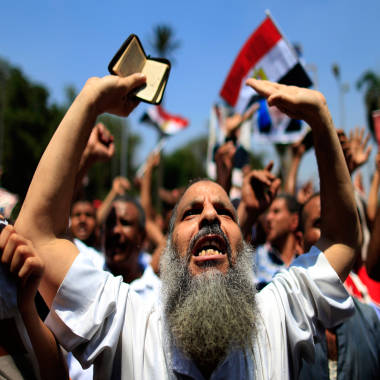The Muslim Brotherhood claims new video shows the Egyptian military opening fire on a group of protesters outside the Cairo barracks where ousted president Mohammad Morsi is believed to be. Reports say at least 42 people were killed. NBC's Tracy Potts reports.
By Charlene Gubash and Jason Cumming, NBC News
CAIRO -- At least?51 people were killed and 435 injured in clashes early Monday near the Republican Guard headquarters in the Egyptian capital, the Ministry of Health said.
Supporters of deposed President Mohammed Morsi had been holding a sit-in near the compound.
Reuters cited the Egyptian military as saying "a terrorist group" had tried to storm the building early Monday. A Ministry of Defense official said that 200 people were arrested after protesters attacked the site around 4 a.m. local time (10 p.m. ET on Sunday). Some were armed with guns, Molotov cocktails and knives, according to the official. One officer was killed and six troops wounded, the military said.?
However, Morsi's Muslim Brotherhood and its allies accused security forces of attacking protesters.?NBC News was not immediately able to reconcile the differing accounts.
Members of the Muslim Brotherhood have been protesting near the Republican Guard headquarters since Morsi was removed from office, amid speculation he may be under house arrest at the site.
Morsi was ousted by Egypt's military last week just one year into his four-year term in the wake of huge protests demanding that he quit. The Islamist was replaced by an interim leader?and new elections have been promised but no timeline has been announced.
At a news conference, Colonel Ahmad Mohammad Ali, a spokesman for the Egyptian military, blamed the protesters, saying they had attacked police who were ?securing the area.?
?They were on top of buildings?they either fired or threw things down,? the spokesman said, adding that there had been 42 soldiers injured, eight of whom were in a critical condition.
?They were firing live ammunition and the military had to defend itself,? the spokesman said.
A statement by the Brotherhood-linked Freedom and Justice Party said more than 53 had been killed and 1,000 injured.
"Early on Monday, supporters of the legitimate elected President Mohammed Morsi performing the dawn prayer outside the Republican Guard headquarters were massacred with heavy gunfire, live bullets, birdshot and tear gas," the party said in a statement on its website.
Witness Al-Shaimaa Younes, who was at the sit-in, told The Associated Press that troops and police forces opened fire on the protesters during early morning prayers.
"They opened fire with live ammunition and lobbed tear gas," she added. "There was panic and people started running. I saw people fall."
Abdul Baset Mohammed, 38, said he was part of the group praying near the Republican Guard headquarters where the shooting happened. ?
?The shooting was from the back,? Mohammed said, adding that those responsible were ?army snipers? shooting from rooftops. NBC News could not verify his account of the events.
?We pay for their food and their water from our money,? he said, referring to the Egyptian military. ?They should point their bullets at Israel, not at us. Our demonstrations are always peaceful.??

Hassan Ammar / AP
Days of massive protests and a military ultimatum forced the country's first democratically elected president from office.
Turkish Foreign Minister Ahmet Davutoglu also condemned Monday's incident as a "massacre," Reuters reported.
"I strongly condemn the massacre that took place in Egypt at morning prayer in the name of the fundamental human values which we have been advocating,'' Davutoglu said on Twitter.
British Foreign Minister William Hague issued a statement condemning "the violence that led to the deaths of over 40 people during demonstrations in Egypt overnight." He also called for the release of detained political leaders and journalists.
At least 35 people also died in violence on Friday and Saturday in violence that came two and a half years after autocratic ruler Hosni Mubarak was toppled in a 2011 uprising.
NBC News' Producer Ghazi Balkiz, the Associated Press and Reuters contributed to this report.
Related:
This story was originally published on Mon Jul 8, 2013 11:27 AM EDT
wii u wii u American Music Awards turkey brine Imessage Not Working mc hammer pecan pie recipe